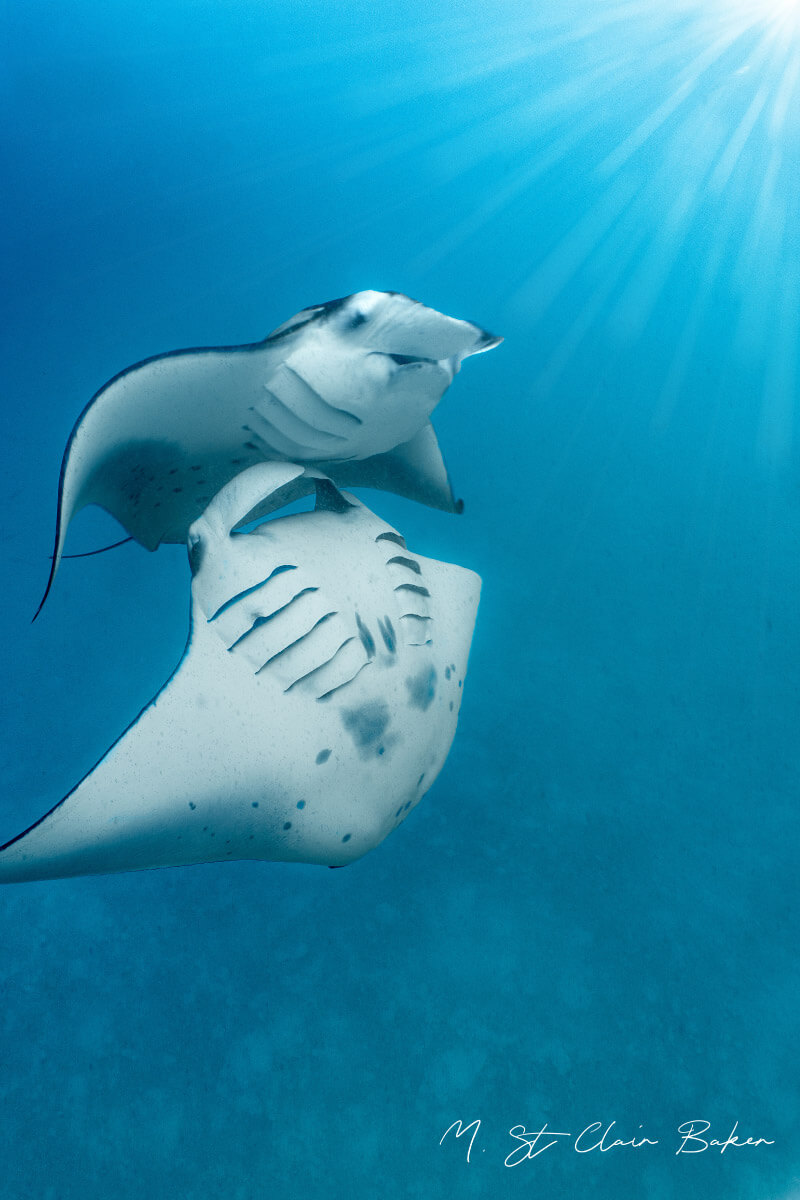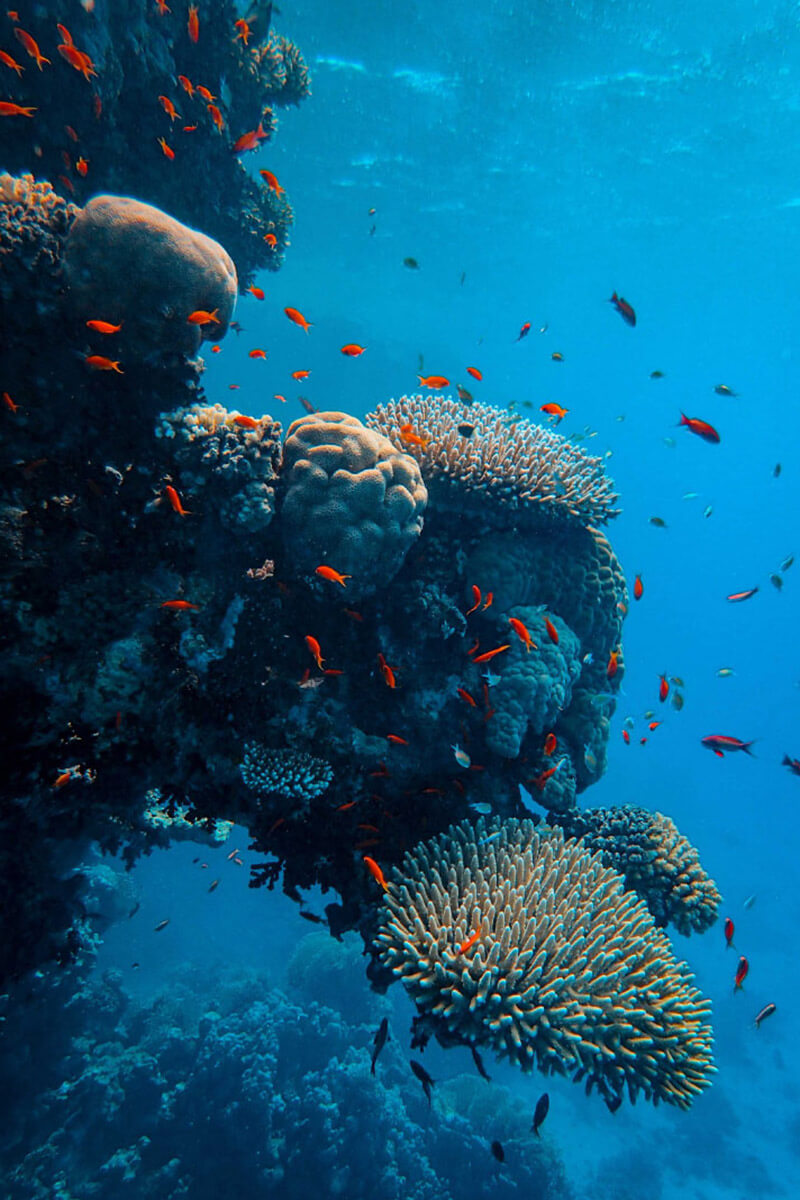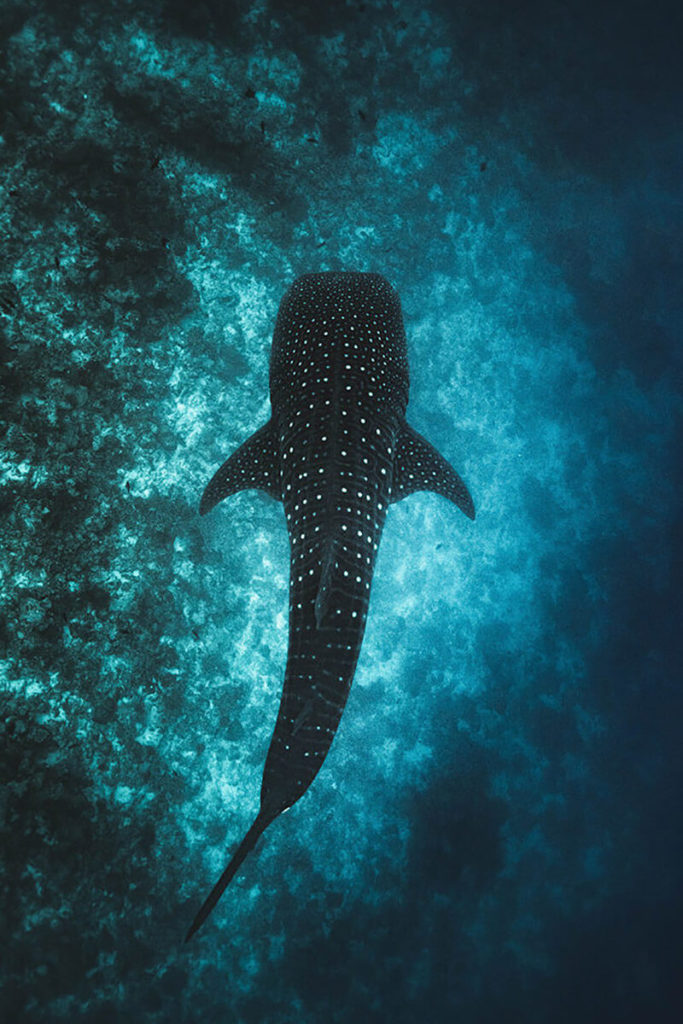Adelaar has always been committed to keeping the marine environment safe and is determined to fight for its preservation. Yet, among all the possible & noble initiatives, three of them hold a very special place in our heart. We sail through the Coral Triangle, so our first concerns naturally go to the reef that is home to hundreds of species and contributes to the health of an entire ecosystem. Also threatened by mankind, Manta rays & whale sharks are two incredible species that we would love to see swimming peacefully in the Indonesian waters. Discover how Adelaar contributes to marine conservation and join us on a trip to help preserve the species!
“Manta rays, the ocean giants”
Two species of manta rays can be seen in Komodo National Park. The reef manta (Manta alfredi) and the giant manta (Manta birostris). The average fin span of these giants can be 5 to 7 meters and they can weigh up to to 1350 kg (Manta alfredi) or 4000 kg (Manta birostris). They settled in Komodo long before a liveaboard came to explore these remote waters. Both species are classified by the IUCN (International Union for Conservation of Nature) as “vulnerable” (Manta alfredi) and “critically endangered” (Manta birostris). Anthropogenic threats include pollution, entanglement in fishing nets, but also targeted capture for their gill rakers for use in traditional Chinese medicine. That’s why the Adelaar team works hand in hand with marine conservation organizations in Indonesia. Together we are helping to raise awareness among the local population and the diving community to save these giants from extinction.
The trip
For true manta lovers, there are never enough mantas! For this reason, one of our Komodo cruises will be slightly customized to spend more time in the areas of Komodo National Park favored by manta rays. A marine biologist is on board to talk about her work on site and what is being done to protect these elegant and graceful creatures. In her presentation she explains everything you need to know about manta rays. Including the fact that they are no longer called “mantas.”

“Conservation is much more than just a victory. Effective conservation is more than a one-time culmination of effort and intention, but a lifelong commitment that requires constant care and vigilance. To believe otherwise provokes not only disappointment and failure, but also a threat to our most valuable resources.”
Shawn Heinrichs

“In 100 years, 50% of all species could be gone”
The Coral Triangle is a maritime area in the western Pacific that includes the waters of Indonesia. Nearly 600 species of coral support six of the world’s seven sea turtle species and more than 2,000 species of coral reef fish. In addition, the local population in Indonesia also depends on the well-being of the coral reefs. So the challenge we face now is to protect these reefs and help residents develop sustainable solutions for everyday life. One of the most diverse habitats in the world is at risk.
The trip
As all Adelaar’s routes are located on the coral triangle, it seemed like a must for us to organize a trip dedicated to Coral Reef rehabilitation. On these special cruises, we’ll host a coral specialist who’ll lead a course about corals, workshops, and identification games, as well as an excursion to a coral rehabilitation center on the North coast of Sumbawa.
“The innocence of nature deserves the power of mankind.”
Ben Hicks
“The gentle giants are vulnerable due to poor scientific knowledge”
The Whale shark, like other shark and ray species, is a slow growing animal with low fecundity. Although not mainly hunted for their fins, in some parts of the world, whale sharks still are actively hunted by fishermen, mainly for their meat. Because they often aggregate during surface feeding, they are quite vulnerable to boat strikes and to being caught. Yet, one of the most critical things about whale sharks is that there is very little knowledge of their biology and reproduction. That provides a big challenge for us to properly protect them. The money raised during the #GoTagMe campaign will therefore be used to purchase tags & then host a tagging operation of Indonesian Whale Sharks aboard Adelaar.
The trip
On every cruise passing by Sumbawa, we now stop in Teluk Saleh for diving and snorkeling with whale sharks. This hidden gem offers calm waters and up-close encounters with these gentle giants near the local fishing platforms. Conservation efforts have made Teluk Saleh a sanctuary, allowing guests to swim alongside the world’s largest fish. This several-hour stop is both thrilling and educational, deepening our connection to the ocean and its marine life.
Conservation International was instrumental in tagging the sharks and educating the local villages on conservation measures to preserve the habitat of these gentle giants.

Book your Marine Conservation Cruise
Join one of our Marine Conservation Cruises in Indonesia and become an active member of the change. Aboard Adelaar, the utmost
importance is attached to the preservation of the environment as well as the protection of the vulnerable wildlife.
Learn everything you need to know about Manta Rays, Whale Sharks and Corals by boarding these dedicated trips!
Sign up for our newsletter




